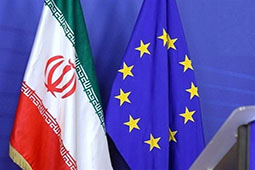
EU Channel for Trade with Iran Facing New Obstacle

The Financial Times quoted EU diplomats as saying that several hurdles remained to putting the financial channel into practice, including the reluctance of member states to host the new financial structure.
During European Commission meetings last week to prepare a response to the US sanctions, officials discussed how no member state was willing to host the base for the new Iran set-up, diplomats said.
“No EU government wants to cross the US by having the SPV,” an official said, referring to the “special purpose vehicle” that Europeans want to set up to process Iran’s import and export payments once the fresh round of US sanctions against Iran would come into force on November 4.
“(EU) member states are not exactly queueing up for it,” another diplomat told FT.
European diplomats say the EU countries fear the US could punish them politically or even with extra sanctions for hosting the financial mechanism that helps Iran avert the sanctions.
However, the European diplomats stressed that the work to defy the US could yet yield a result before the latest sanctions are restored, or shortly after.
The EU has also activated a law to forbid its companies from complying with US sanctions, though many big European companies have decided to pull back from Iran, rather than risk Washington’s wrath.
EU countries led by France, Germany and Britain -signatories to the 2015 Iran nuclear deal- want to enable non-US trade with Iran to continue in defiance of Washington.
US Secretary of State Mike Pompeo claimed last month that the ‘special purpose vehicle’ plan was “one of the most counterproductive measures imaginable for regional global peace and security”.
In late September, Iranian Deputy Foreign Minister Abbas Araqchi made it clear for Europeans that their proposed mechanism for neutralizing the US oil and banking sanctions against Iran must be fully or partly carried out by November 4.
Even if not fully in force, at least the framework of the European mechanism for sustained trade with Iran under the fresh round of American sanctions must be defined until November 4 and part of it should be working, Araqchi said.
On May 8, US President Donald Trump pulled his country out of the JCPOA, which was achieved in Vienna in 2015 after years of negotiations among Iran and the Group 5+1 (Russia, China, the US, Britain, France and Germany).
The US has also re-imposed sanctions on Iran and has devised a new wave of economic sanctions, which are aimed at pushing Iran’s oil exports down to zero.


Trump weighs using $2 billion in CHIPS Act funding for critical minerals

Electra converts debt, launches $30M raise to jumpstart stalled cobalt refinery

Codelco cuts 2025 copper forecast after El Teniente mine collapse

Barrick’s Reko Diq in line for $410M ADB backing

Abcourt readies Sleeping Giant mill to pour first gold since 2014

SQM boosts lithium supply plans as prices flick higher

Nevada army depot to serve as base for first US strategic minerals stockpile

Pan American locks in $2.1B takeover of MAG Silver

Viridis unveils 200Mt initial reserve for Brazil rare earth project

Kyrgyzstan kicks off underground gold mining at Kumtor

Kyrgyzstan kicks off underground gold mining at Kumtor

KoBold Metals granted lithium exploration rights in Congo

Freeport Indonesia to wrap up Gresik plant repairs by early September

Energy Fuels soars on Vulcan Elements partnership

Northern Dynasty sticks to proposal in battle to lift Pebble mine veto

Giustra-backed mining firm teams up with informal miners in Colombia

Critical Metals signs agreement to supply rare earth to US government-funded facility

China extends rare earth controls to imported material

Galan Lithium proceeds with $13M financing for Argentina project

Kyrgyzstan kicks off underground gold mining at Kumtor

Freeport Indonesia to wrap up Gresik plant repairs by early September

Energy Fuels soars on Vulcan Elements partnership

Northern Dynasty sticks to proposal in battle to lift Pebble mine veto

Giustra-backed mining firm teams up with informal miners in Colombia

Critical Metals signs agreement to supply rare earth to US government-funded facility

China extends rare earth controls to imported material

Galan Lithium proceeds with $13M financing for Argentina project

Silver price touches $39 as market weighs rate cut outlook

















